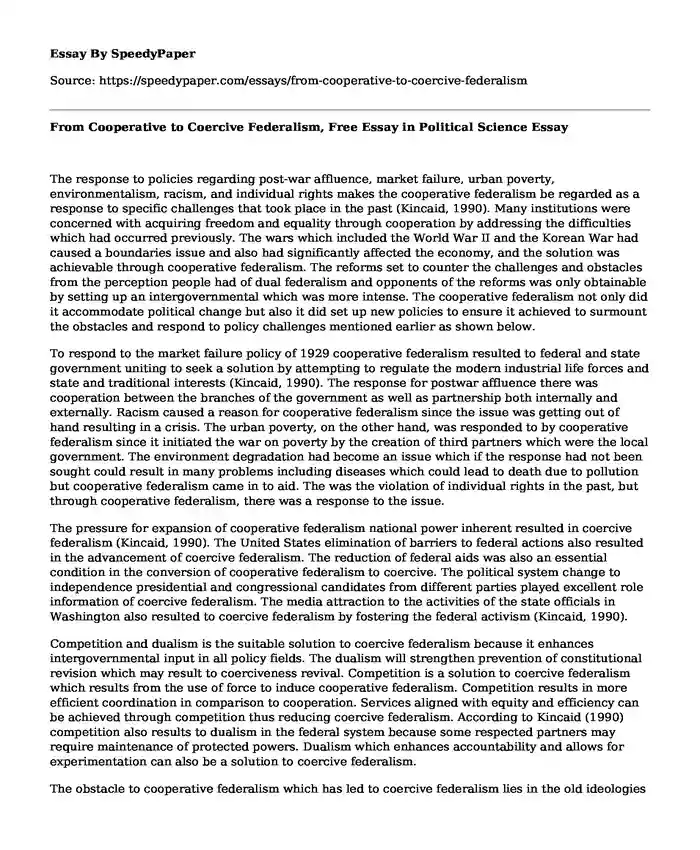
| Type of paper: | Essay |
| Categories: | United States Political science Federalism |
| Pages: | 3 |
| Wordcount: | 690 words |
The response to policies regarding post-war affluence, market failure, urban poverty, environmentalism, racism, and individual rights makes the cooperative federalism be regarded as a response to specific challenges that took place in the past (Kincaid, 1990). Many institutions were concerned with acquiring freedom and equality through cooperation by addressing the difficulties which had occurred previously. The wars which included the World War II and the Korean War had caused a boundaries issue and also had significantly affected the economy, and the solution was achievable through cooperative federalism. The reforms set to counter the challenges and obstacles from the perception people had of dual federalism and opponents of the reforms was only obtainable by setting up an intergovernmental which was more intense. The cooperative federalism not only did it accommodate political change but also it did set up new policies to ensure it achieved to surmount the obstacles and respond to policy challenges mentioned earlier as shown below.
To respond to the market failure policy of 1929 cooperative federalism resulted to federal and state government uniting to seek a solution by attempting to regulate the modern industrial life forces and state and traditional interests (Kincaid, 1990). The response for postwar affluence there was cooperation between the branches of the government as well as partnership both internally and externally. Racism caused a reason for cooperative federalism since the issue was getting out of hand resulting in a crisis. The urban poverty, on the other hand, was responded to by cooperative federalism since it initiated the war on poverty by the creation of third partners which were the local government. The environment degradation had become an issue which if the response had not been sought could result in many problems including diseases which could lead to death due to pollution but cooperative federalism came in to aid. The was the violation of individual rights in the past, but through cooperative federalism, there was a response to the issue.
The pressure for expansion of cooperative federalism national power inherent resulted in coercive federalism (Kincaid, 1990). The United States elimination of barriers to federal actions also resulted in the advancement of coercive federalism. The reduction of federal aids was also an essential condition in the conversion of cooperative federalism to coercive. The political system change to independence presidential and congressional candidates from different parties played excellent role information of coercive federalism. The media attraction to the activities of the state officials in Washington also resulted to coercive federalism by fostering the federal activism (Kincaid, 1990).
Competition and dualism is the suitable solution to coercive federalism because it enhances intergovernmental input in all policy fields. The dualism will strengthen prevention of constitutional revision which may result to coerciveness revival. Competition is a solution to coercive federalism which results from the use of force to induce cooperative federalism. Competition results in more efficient coordination in comparison to cooperation. Services aligned with equity and efficiency can be achieved through competition thus reducing coercive federalism. According to Kincaid (1990) competition also results to dualism in the federal system because some respected partners may require maintenance of protected powers. Dualism which enhances accountability and allows for experimentation can also be a solution to coercive federalism.
The obstacle to cooperative federalism which has led to coercive federalism lies in the old ideologies due to lack of consensus. The argument has objected to the competition which is the cure for coercive federalism that it can drive out equity policies. The constitution has also been a significant obstacle to acquisition cooperative federalism with an example of the invocation of the Tenth Amendment in National League of Cities v. Usery in 1976 by the United States Supreme Court (Kincaid, 1990). Centralization was also an obstacle of Cooperative federalism since inception; the reforms could not advance under the banner of unification. The other barrier of cooperative federalism was the decline of affluence and rise of resentment which included "the tax revolt and establishment of Standing Committee on International Trade and Foreign Affairs by the National Governors' Association" (Kincaid, 1990).
Reference
Kincaid, J. (1990). From Cooperative to Coercive Federalism. New York, NY: Sage Publications, Inc. in association with the American Academy of Political and Social Science.
Cite this page
From Cooperative to Coercive Federalism, Free Essay in Political Science. (2022, Feb 23). Retrieved from https://speedypaper.com/essays/from-cooperative-to-coercive-federalism
Request Removal
If you are the original author of this essay and no longer wish to have it published on the SpeedyPaper website, please click below to request its removal:
- Luxury Car Market Share Research in Our Free Essay Example
- Free Essay Describing the Benefits of Travelling
- Leadership Research Essay Example
- Selecting the Best Investment Alternative, Essay Example
- Essay Example: Personal Statement for an MBA Admission
- Free Paper Sample Describing the Application of Ethical Leadership
- Free Essay Example: Summaries About Japan
Popular categories




